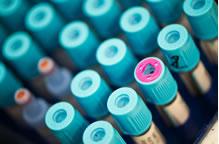Leukaemia and Non-Hodgkin Lymphoma Diagnosis and Monitoring
The laboratory provides a comprehensive service in the investigation of Leukaemia and Non-Hodgkin Lymphoma. Immunophenotyping provides additional information to morphology and cytogenetics in the diagnosis, classification and monitoring of these disorders.
HIV Monitoring
Immunophenotyping is used serially to monitor CD4 levels.
Investigation of Cellular Immunodeficiency Disease
Wrong choice of tests, especially in the paediatric setting, can mean rare cases of immunodeficiency are missed. Vital information includes type and site of infections, family history, other pathology results, X-rays and clinical features. Please refer to the Clinical Immunologists; ward or clinic referral is the ideal.
- Immunophenotyping
Identifies numerical defects in lymphocyte subsets, inherited or acquired, and are indicated in cases with recurrent viral, fungal or mycobacterial infection.
- PNH Testing
PNH testing performed on peripheral blood samples looking for the absence of GPI-linked proteins on neutrophils, monocytes and red blood cells.
- Functional Leucocyte Assays
These assays are technically complex and require prior discussion with the laboratory. Abnormalities are rare, most commonly due to poor sample quality, testing during drug therapy or intercurrent infection. Abnormal findings should always be confirmed on a second sample. True abnormalities may need further, more specialised tests to specify the disorder.
Lymphocyte function studies are indicated in cases of recurrent viral, fungal and mycobacterial infections in whom no numerical lymphocyte defect has been defined. The investigation provides a measure of lymphocyte activation. Lymphocytes are cultured for 5 days with mitogens which mimic antigen activation.
Neutrophil function studies screen for defects in the metabolic burst and adhesion molecules and are indicated in cases with recurrent fungal or bacterial infection with a normal neutrophil count (>1x109/1).A normal result excludes major defects in neutrophil function.
Quantiferon Assay
The QuantiFERON-TB test is an interferon gamma release assay (IGRA) used for the diagnosis of latent Tuberculosis (TB). The assay requires special blood tubes and has specific sample handling requirements. The laboratory can issue guidance and sample tubes to requestors. Interpretation of the result needs to be in the context of clinical history and other laboratory and clinical investigations. The antigens used in the test are absent from all BCG vaccine strains of TB and from most known non-tuberculoid mycobacteria, it is possible to have a reactions to M. kansasii, M. szulgai and M. marinarum. If such infections are suspected, alternative testing should be sought.
The QuantiFERON-TB test (and other TB IGRAs) may give false negative results in immunosuppressed patients. The laboratory provides a positive control tube for all tests to ensure the validity of results. Where the positive control fails (indeterminate result) the laboratory may suggest alternative testing. Please see guide below for interpreting indeterminate results.
Guide to interpretation
• Negative: A negative result indicates that latent infection with M. tuberculosis is NOT likely. This result does NOT exclude active TB infection. The investigation of suspected active TB requires clinical, radiological and microbiological assessment.
• Positive: A positive result is consistent with latent or active TB. This result may be due to exposure to M.tuberculosis complex (except M. bovis BCG), M. kansasii, M. szulgai or M. marinarum. IGRA should not be used for the investigation of suspected active TB. The investigation of suspected active TB requires clinical, radiological, and microbiological assessment.
• Indeterminate: The likelihood of the patient having M. tuberculosis infection cannot be determined from the blood sample provided. Please see the guide to interpreting indeterminate results below:
Quick guide to interpreting Indeterminate QuantifFERON-TB results:
An indeterminate result from the QuantiFERON-TB assay means that the likelihood of the patient having M. tuberculosis infection cannot be determined from the blood sample provided.
The majority of indeterminate results are caused by a low T lymphocyte response to mitogen stimulation (reported as mitogen tube failure).
This can be caused by:
• An insufficient number of T lymphocytes in the blood sample. Is the patient immunosuppressed?
• A functional inability of the patient’s lymphocytes to generate Interferon-gamma (IFN-γ) in response to mitogenic stimulation, for example if they are taking drugs that supress their immune system.
• Reduced lymphocyte function due to improper sample handling.
Ideally repeat the QuantiFERON-TB test once with a fresh blood sample. If a mitogen tube failure is reported a second time, there is no value in repeating the QuantiFERON-TB test again until the underlying cause has been identified and resolved.
Rarely a high background in the negative control (Nil) tube generates an indeterminate result.
This can be caused by:
• Excessive levels of circulating IFN-γ or the presence of heterophile antibodies in the sample. Stimulating the cells further as part of the QuantiFERON-TB test does not produce a further IFN-γ response.
Ideally repeat the QuantiFERON-TB test once with a fresh blood sample. If a high background is reported a second time, there is no value in repeating the QuantiFERON-TB test again until the underlying cause has been identified and resolved.
Other causes of indeterminate results can include:
• Incorrect filling/mixing of the Lithium Heparin or QuantiFERON-TB tubes.
• If the time between venepuncture and sample incubation in the laboratory is greater than 16 hours.
These indeterminate samples should be repeated using the correct sampling and handling procedures.
For further information please see:
Test Information

Includes details of sample types, volumes, special precautions, turnaround times & reference ranges.
